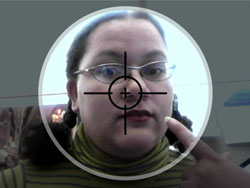HP Face Tracking Software Not Racist, Just Contrast Challenged
Recently the tech blogosphere caught on to a YouTube video where electronics store employees tested the webcam on an HP MediaSmart computer and found that, under their test conditions, the MediaCenter's Face Tracking feature did not recognize black faces, but did recognize white ones. In case you haven't seen:
HP posted a response on its Voodoo Blog and asserted that poor lighting or possibly faulty algorithms are to blame. An admin nicknamed Frosty wrote:
We are working with our partners to learn more. The technology we use is built on standard algorithms that measure the difference in intensity of contrast between the eyes and the upper cheek and nose. We believe that the camera might have difficulty “seeing” contrast in conditions where there is insufficient foreground lighting.
HP also advised users to see its webcam help page for assistance in adjusting the brightness and contrast settings.
Since we have some HP notebooks around the office, I decided to test out these theories. I grabbed the HP Envy 15 and my co-workers Dana Wollman (who is white) and Jeffrey Wilson (who is black) to see which of us the Face Tracker was able to recognize.
At first, the Envy 15 (mistakenly identified as the Envy 13 in the video) tracked all of our faces accurately in a well-lit room, but the captured image was washed out and very bright. A quick look into the settings revealed that the Backlight Correction was set to 2 (the highest it will go), so I brought it down to 0. With Backlight Correction off, our picture looked more like the one in the YouTube video above. Plus, the Face Tracker no longer worked on Jeffrey, though it still worked on Dana and myself.
See for yourself in the videos below. The first was filmed with no Backlight Correction, the second filmed with this feature turned on.
Though it's obvious that the bias isn't racial in nature but instead based on lighting conditions and the camera's ability to distinguish between shadow and human face, this does bring up an interesting question: when testing this software, how many of the involved project members were dark-skinned? How many different lighting conditions were tested? The software was likely developed by a third party, not HP, so this is probably an issue on a number of webcams across several manufacturers. Perhaps this incident is an indication that the software makers should involve a greater pool of testers when designing these features.
Sign up to receive The Snapshot, a free special dispatch from Laptop Mag, in your inbox.
If you've got a webcam on your notebook that includes Face Tracking as a feature, we'd be interested to see your results. Turn the Backlight Correction on, then off. Fiddle with the brightness and contrast. See under what conditions the software is able to track you and which it isn't. Post links to your videos here, we'd be interested in the results.
K. T. Bradford writes about laptops, apps, and ebook readers for Laptop Mag. She has written reviews of some of the most iconic laptops from the last decade and more, covering models such as the Acer Aspire One, the Samsung R580, and the Lenovo IdeaPad S205. Some of her other reviews include MSI, HP, Dell, and Asus notebooks.

